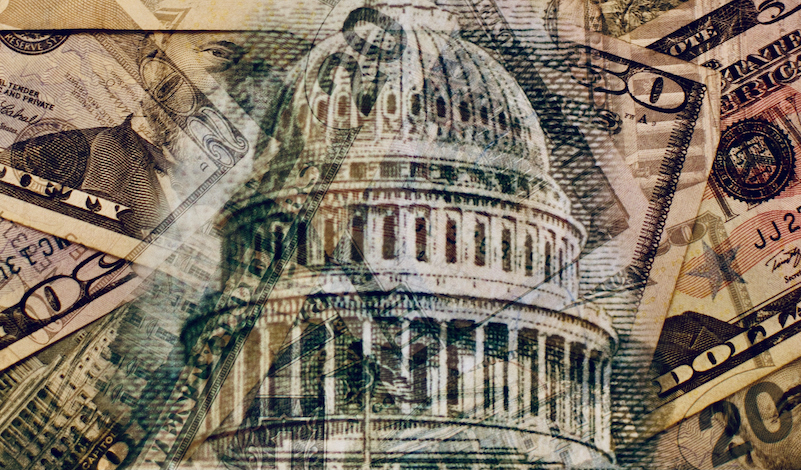
Legal experts argue that corporate political spending harms both shareholders and management.
Corporate spending on midterm elections doubled from 2010 to 2014, and then doubled again from 2014 to 2018. This increase in corporate political spending harms investors, executives, and stakeholders at large, argue legal experts Dorothy Lund and Leo Strine in a recent article.
To increase accountability to their shareholders and enable their executives to focus on running the company, corporations should scale back or even halt political spending, according to Lund and Strine. They urge companies that continue to spend money on campaigns to improve the legitimacy of their corporate donations. Lund and Strine suggest that providing greater transparency and shareholder input into their political strategies could help create this legitimacy.
Before Citizens United v. Federal Election Commission, a landmark U.S. Supreme Court case decided in 2010, direct corporate contributions to political candidates had been prohibited by federal law. But in Citizens United, the Supreme Court held that corporations could spend unlimited money on elections. As a result, political spending has soared since 2010.
Lund and Strine claim that such corporate political spending harms shareholders because these contributions cannot possibly reflect the diverse views of all investors. Lund and Strine write that the “scholarly consensus has been that the only thing uniting company investors is their desire for a solid return.” Companies gave $282 million to Republican candidates, but only $38 million to Democrats between 2010 and 2020, a discrepancy that likely does not align with shareholder preferences.
Most corporate leaders do not even disclose their contributions, leaving shareholders in the dark about company spending. This has led to increased frustration with the post-Citizens United status quo, emphasize Lund and Strine.
As a result, investors have submitted shareholder proposals demanding greater disclosure of political spending. In 2019, shareholders initiated 33 such proposals, a large increase from the previous year. These proposals received 36 percent of shareholder votes. According to Lund and Strine, support for such proposals increased in 2020.
In addition to harming shareholders, Lund and Strine further describe how corporate donations harm executives. In an era of increased scrutiny over environmental, social and governance (ESG) practices, managers are speaking out about racial and gender diversity, climate change, employee rights, and more. Lund and Strine explain that, after Citizen’s United, managers have also faced pressure to give to candidates who favor the company’s preferred regulatory policies. Yet politicians with favorable regulatory policies often also have practices that can be contrary to a company’s stated ESG goals.
Companies that claim to be concerned with climate change, for example, have donated to political groups that have challenged the U.S. Environmental Protection Agency’s Clean Power Plan. Likewise, companies that claim to protect LGBTQ rights have contributed to campaigns of politicians who supported the 2016 “bathroom bill” which prevented transgender people from using bathrooms that match their gender identity.
According to Lund and Strine, corporations often fund candidates with views antithetical to the company’s publicly stated values. Many corporations increasingly fall into this “hypocrisy trap” and undermine management’s reputation and legitimacy, Lund and Strine explain
Corporate donations also harm society at large, suggest Lund and Strine. Research indicates that companies that spend heavily on politics perform worse than those who do not, which can in turn harm all stakeholders, contend Lund and Strine. They further emphasize that stakeholders do not benefit when companies lobby to reduce regulation that shifts costs from the corporation onto society, such as climate change or hazardous workplaces.
Lund and Strine conclude that the best remedy would be to stop corporate political spending altogether. After the U.S. Capitol Attack on January 6, 2021, Charles Schwab discontinued its political action committee (PAC). Blackrock, among other companies, suspended political contributions. Lund and Strine urge other companies to follow their lead.
Acknowledging that some companies may not want to withdraw fully from the political process, Lund and Strine offer several alternatives.
They suggest that corporations could limit their political involvement to lobbying and speaking up only on issues that the board has claimed are consistent with company values.
If companies insist on donating, companies could commit to giving donations only through a PAC that raises voluntary money from shareholders. And even then, the PAC should only give to candidates whose policies align with those of the company, urge Lund and Strine.
Lund and Strine also recommend that companies, if they must, make political contributions only under a political spending plan approved by a supermajority vote of shareholders at the company’s annual meeting.
Lund and Strine argue that only by making these changes can the world become a better and more transparent place.



